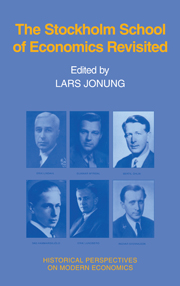Book contents
- Frontmatter
- Dedication
- Contents
- Preface
- List of Contributors
- Dramatis Personae at the end of 1937
- Introduction and Summary
- Part I The roots
- 1 The Political Economy Club and the Stockholm School, 1917–1951
- 2 Gösta Bagge, the Rockefeller Foundation, and empirical social science research in Sweden, 1924–1940
- 3 The Committee on Unemployment and the Stockholm School
- Part II The approach of the Stockholm School
- Part III The impact of the Stockholm School
- Part IV What remains of the Stockholm School?
- The Stockholm School: A non-Swedish bibliography
1 - The Political Economy Club and the Stockholm School, 1917–1951
Published online by Cambridge University Press: 05 July 2013
- Frontmatter
- Dedication
- Contents
- Preface
- List of Contributors
- Dramatis Personae at the end of 1937
- Introduction and Summary
- Part I The roots
- 1 The Political Economy Club and the Stockholm School, 1917–1951
- 2 Gösta Bagge, the Rockefeller Foundation, and empirical social science research in Sweden, 1924–1940
- 3 The Committee on Unemployment and the Stockholm School
- Part II The approach of the Stockholm School
- Part III The impact of the Stockholm School
- Part IV What remains of the Stockholm School?
- The Stockholm School: A non-Swedish bibliography
Summary
On October 1, 1936, the Stockholm economists hosted a very distinguished guest, John Maynard Keynes. Homeward bound from a visit to the Soviet Union, Keynes appeared at the Political Economy Club. The minutes, as recorded by Ingvar Svennilson, report:
1. At the invitation of the club, Mr. J. M. Keynes lectured at the Institute of Social Science on the subject “My grounds for departure from orthodox economic traditions.” The lecture was arranged with support from J. H. Palme's fund for economic education and economic research. Some 100 persons attended the lecture.
2. Following the lecture, the club arranged a dinner at the student union building. In addition to Mr. and Mrs. Keynes, the dinner was attended by: the chairman Professor Ohlin, Miss Kock, Messrs. Björk, Böök, Cederwall, Dahlgren, Hammarskjöld, Helger, Johansson, Lagercrantz (guest), Lundberg, Myrdal, Rothlieb, Rooth, Suoviranta (Finland, guest) and Wigforss, as well as the undersigned. After dinner there was a discussion that continued until midnight.
The general content of Keynes's lecture is known. In accounting for the reasons he departed from the classical tradition, Keynes evidently expounded on the theory of the rate of interest developed in his General Theory (Keynes, 1936). The audience's reception was perhaps not the one Keynes expected. In his memoirs Bertil Ohlin relates with amicable irony that Keynes, in his efforts to clarify what was new and central in his book, surprised the listeners by stressing features that few readers would have considered particularly innovative (Ohlin, 1975, p. 110).
- Type
- Chapter
- Information
- The Stockholm School of Economics Revisited , pp. 41 - 74Publisher: Cambridge University PressPrint publication year: 1991
- 7
- Cited by



